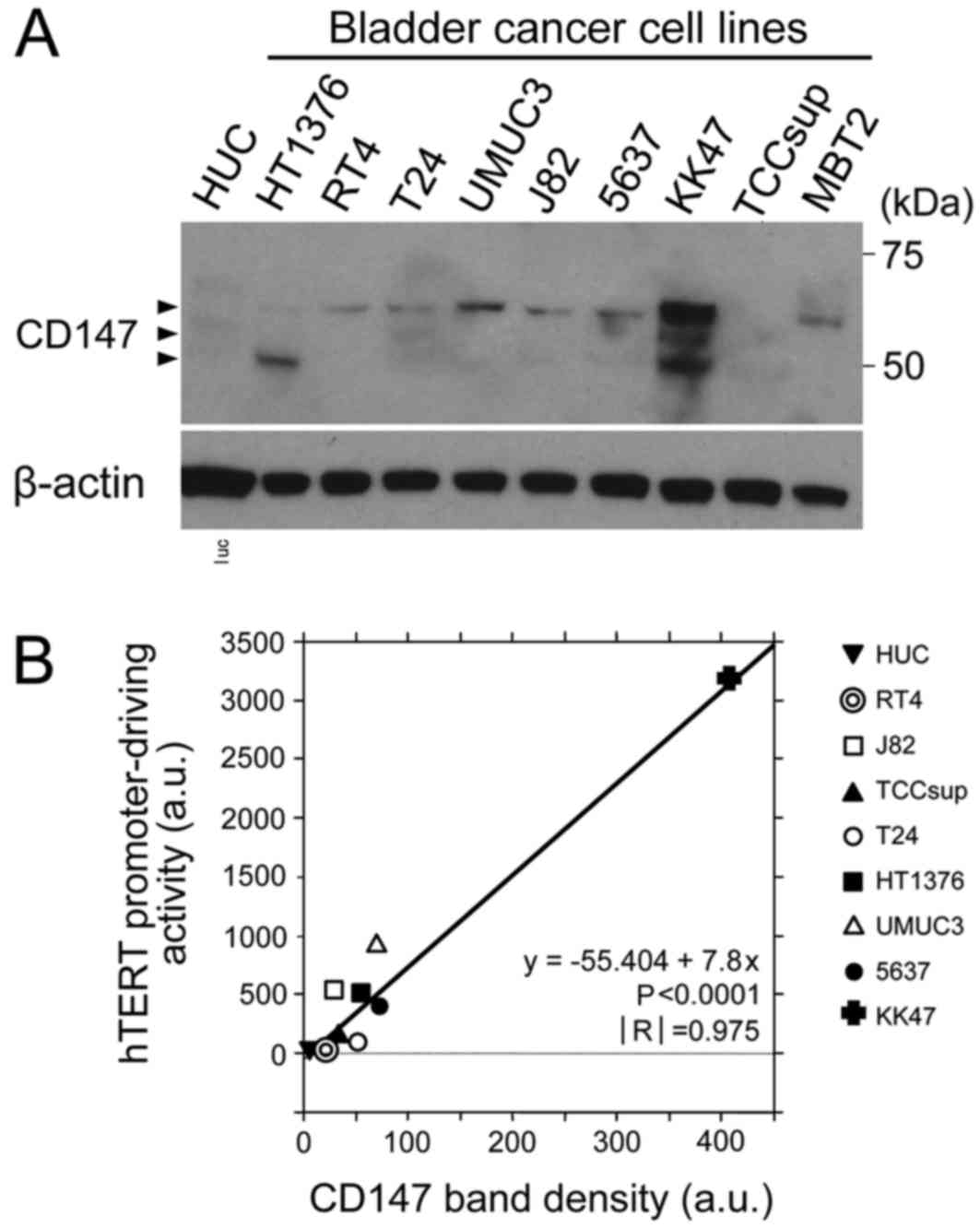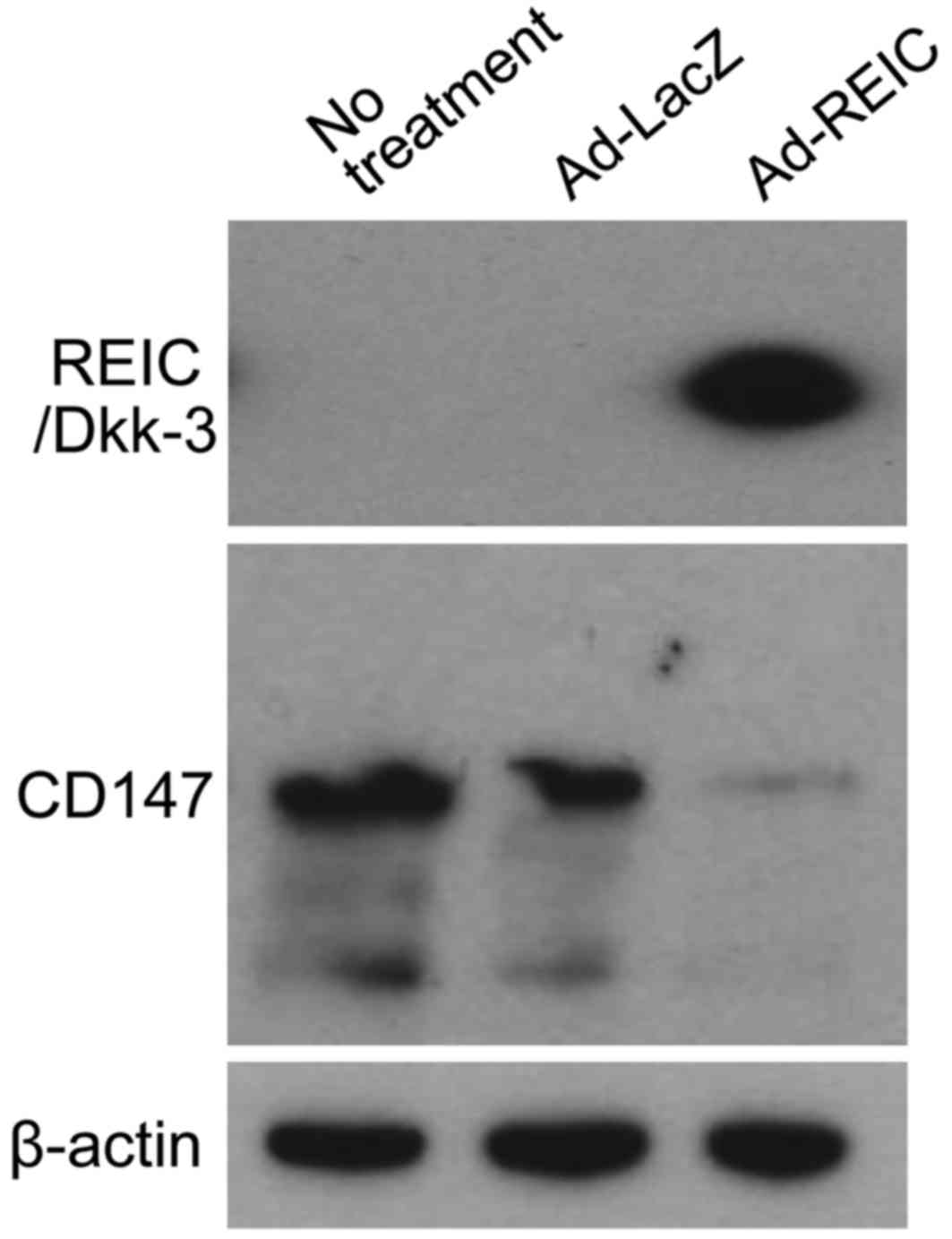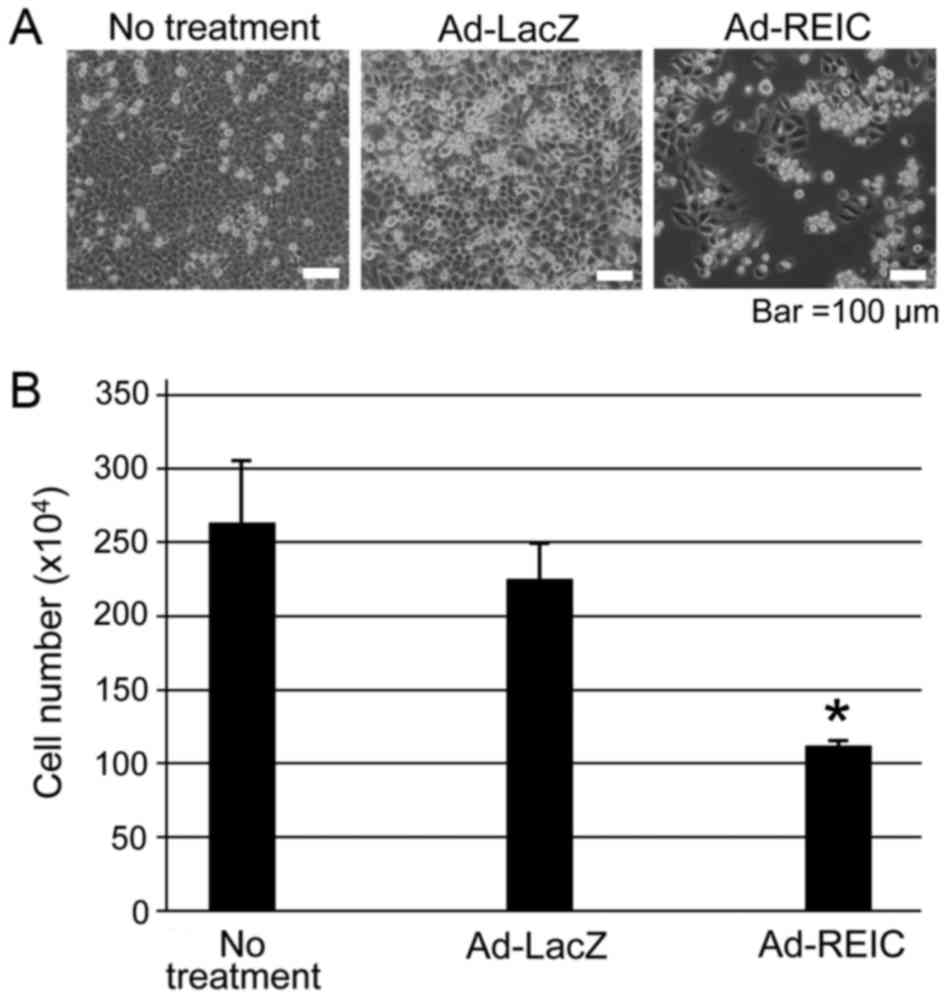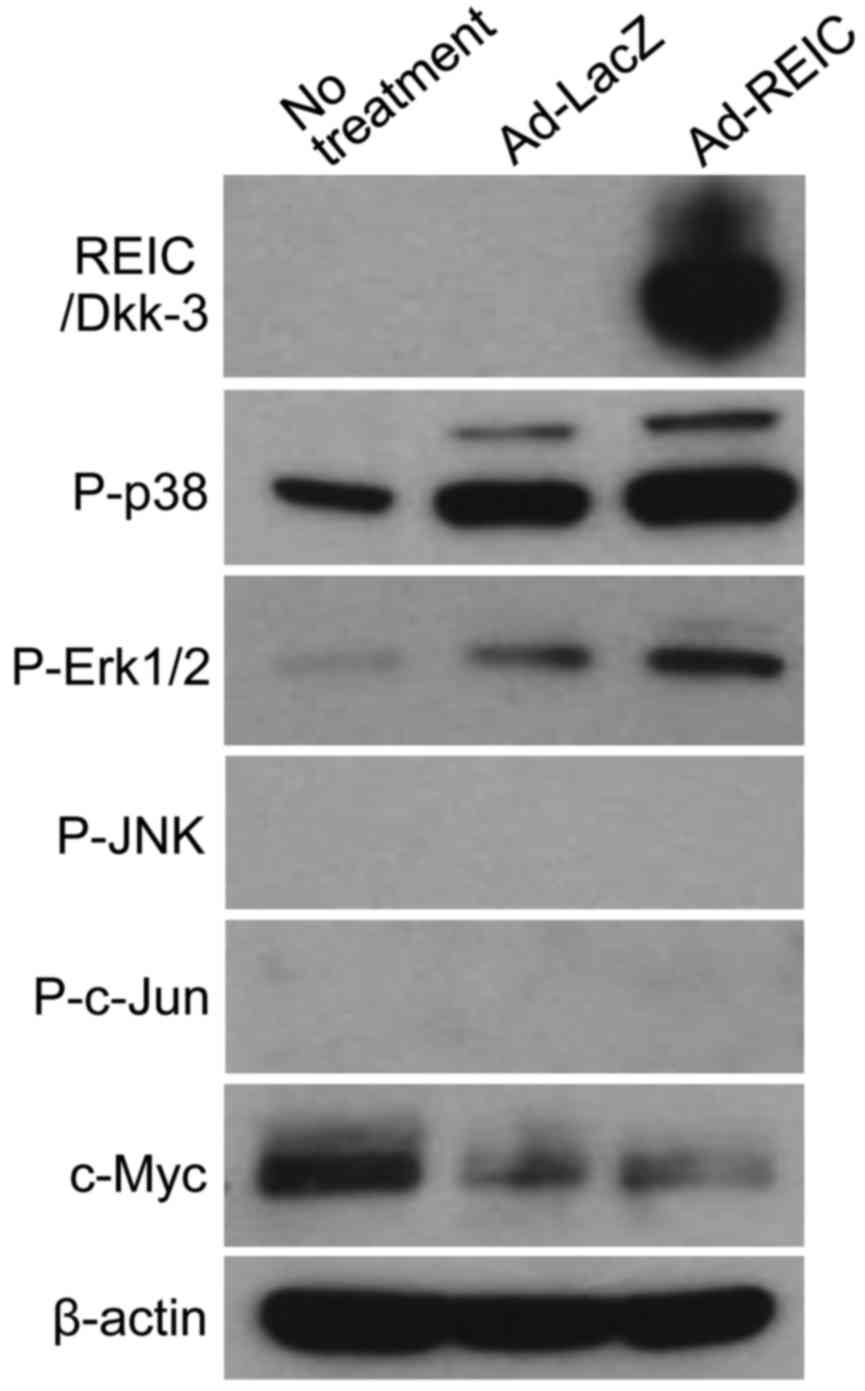|
1
|
Dobruch J and Herr H: Should all patients
receive single chemotherapeutic agent instillation after bladder
tumour resection? BJU Int. 104:170–174. 2009. View Article : Google Scholar : PubMed/NCBI
|
|
2
|
Hirata T, Watanabe M, Kaku H, Kobayashi Y,
Yamada H, Sakaguchi M, Takei K, Huh NH, Nasu Y and Kumon H:
REIC/Dkk-3-encoding adenoviral vector as a potentially effective
therapeutic agent for bladder cancer. Int J Oncol. 41:559–564.
2012.PubMed/NCBI
|
|
3
|
Watanabe M, Sakaguchi M, Kinoshita R, Kaku
H, Ariyoshi Y, Ueki H, Tanimoto R, Ebara S, Ochiai K, Futami J, et
al: A novel gene expression system strongly enhances the anticancer
effects of a REIC/Dkk-3-encoding adenoviral vector. Oncol Rep.
31:1089–1095. 2014.PubMed/NCBI
|
|
4
|
Watanabe M, Nasu Y and Kumon H:
Adenovirus-mediated REIC/Dkk-3 gene therapy: Development of an
autologous cancer vaccination therapy (Review). Oncol Lett.
7:595–601. 2014.PubMed/NCBI
|
|
5
|
Abarzua F, Sakaguchi M, Takaishi M, Nasu
Y, Kurose K, Ebara S, Miyazaki M, Namba M, Kumon H and Huh NH:
Adenovirus-mediated overexpression of REIC/Dkk-3 selectively
induces apoptosis in human prostate cancer cells through activation
of c-Jun-NH2-kinase. Cancer Res. 65:9617–9622. 2005. View Article : Google Scholar : PubMed/NCBI
|
|
6
|
Nabeshima K, Iwasaki H, Koga K, Hojo H,
Suzumiya J and Kikuchi M: Emmprin (basigin/CD147): Matrix
metalloproteinase modulator and multifunctional cell recognition
molecule that plays a critical role in cancer progression. Pathol
Int. 56:359–367. 2006. View Article : Google Scholar : PubMed/NCBI
|
|
7
|
Zhong WD, Chen QB, Ye YK, Han ZD, Bi XC,
Dai QS, Liang YX, Zeng GH, Wang YS, Zhu G, et al: Extracellular
matrix metalloproteinase inducer expression has an impact on
survival in human bladder cancer. Cancer Epidemiol. 34:478–482.
2010. View Article : Google Scholar : PubMed/NCBI
|
|
8
|
Pan Y, He B, Chen J, Sun H, Deng Q, Wang
F, Ying H, Liu X, Lin K, Peng H, et al: Gene therapy for colorectal
cancer by adenovirus-mediated siRNA targeting CD147 based on loss
of the IGF2 imprinting system. Int J Oncol. 47:1881–1889.
2015.PubMed/NCBI
|
|
9
|
Bovenzi CD, Hamilton J, Tassone P, Johnson
J, Cognetti DM, Luginbuhl A, Keane WM, Zhan T, Tuluc M, Bar-Ad V,
et al: Prognostic indications of elevated MCT4 and CD147 across
cancer types: A meta-analysis. Biomed Res Int. 2015:2424372015.
View Article : Google Scholar : PubMed/NCBI
|
|
10
|
Hatanaka M, Higashi Y, Kawai K, Su J, Zeng
W, Chen X and Kanekura T: CD147-targeted siRNA in A375 malignant
melanoma cells induces the phosphorylation of EGFR and
downregulates cdc25C and MEK phosphorylation. Oncol Lett.
11:2424–2428. 2016.PubMed/NCBI
|
|
11
|
Liang YX, Lu JM, Mo RJ, He HC, Xie J,
Jiang FN, Lin ZY, Chen YR, Wu YD, Luo HW, et al: E2F1 promotes
tumor cell invasion and migration through regulating CD147 in
prostate cancer. Int J Oncol. 48:1650–1658. 2016.PubMed/NCBI
|
|
12
|
Le Floch R, Chiche J, Marchiq I, Naiken T,
Ilc K, Murray CM, Critchlow SE, Roux D, Simon MP and Pouysségur J:
CD147 subunit of lactate/H+ symporters MCT1 and hypoxia-inducible
MCT4 is critical for energetics and growth of glycolytic tumors.
Proc Natl Acad Sci USA. 108:16663–16668. 2011. View Article : Google Scholar : PubMed/NCBI
|
|
13
|
Aït-Ali N, Fridlich R, Millet-Puel G,
Clérin E, Delalande F, Jaillard C, Blond F, Perrocheau L, Reichman
S, Byrne LC, et al: Rod-derived cone viability factor promotes cone
survival by stimulating aerobic glycolysis. Cell. 161:817–832.
2015. View Article : Google Scholar : PubMed/NCBI
|
|
14
|
Marchiq I, Albrengues J, Granja S,
Gaggioli C, Pouysségur J and Simon MP: Knock out of the
BASIGIN/CD147 chaperone of lactate/H+ symporters disproves its
pro-tumour action via extracellular matrix metalloproteases (MMPs)
induction. Oncotarget. 6:24636–24648. 2015. View Article : Google Scholar : PubMed/NCBI
|
|
15
|
Kimiya K, Naito S, Soejima T, Sakamoto N,
Kotoh S, Kumazawa J and Tsuruo T: Establishment and
characterization of doxorubicin-resistant human bladder cancer cell
line, KK47/ADM. J Urol. 148:441–445. 1992. View Article : Google Scholar : PubMed/NCBI
|
|
16
|
Ueki H, Watanabe M, Kaku H, Huang P, Li
SA, Ochiai K, Hirata T, Noguchi H, Yamada H, Takei K, et al: A
novel gene expression system for detecting viable bladder cancer
cells. Int J Oncol. 41:135–140. 2012.PubMed/NCBI
|
|
17
|
Mori A, Watanabe M, Sadahira T, Kobayashi
Y, Ariyoshi Y, Ueki H, Wada K, Ochiai K, Li SA and Nasu Y: The
downregulation of the expression of CD147 by tumor suppressor
REIC/Dkk-3, and its implication in human prostate cancer cell
growth inhibition. Acta Med Okayama. 71:135–142. 2017.PubMed/NCBI
|
|
18
|
Hagemann T, Wilson J, Kulbe H, Li NF,
Leinster DA, Charles K, Klemm F, Pukrop T, Binder C and Balkwill
FR: Macrophages induce invasiveness of epithelial cancer cells via
NF-kappa B and JNK. J Immunol. 175:1197–1205. 2005. View Article : Google Scholar : PubMed/NCBI
|
|
19
|
Huang Z, Wang C, Wei L, Wang J, Fan Y,
Wang L, Wang Y and Chen T: Resveratrol inhibits EMMPRIN expression
via P38 and ERK1/2 pathways in PMA-induced THP-1 cells. Biochem
Biophys Res Commun. 374:517–521. 2008. View Article : Google Scholar : PubMed/NCBI
|
|
20
|
Ge H, Zhang JF, Guo BS, He Q, Wang BY, He
B and Wang CQ: Resveratrol inhibits macrophage expression of
EMMPRIN by activating PPARgamma. Vascul Pharmacol. 46:114–121.
2007. View Article : Google Scholar : PubMed/NCBI
|
|
21
|
Liu H, Xu XF, Zhao Y, Tang MC, Zhou YQ and
Gao FH: NS-398 promotes pancreatic cancer cell invasion by CD147
and MMP-2 via the activation of P38. Mol Med Rep. 13:2208–2214.
2016.PubMed/NCBI
|
|
22
|
Kong LM, Liao CG, Zhang Y, Xu J, Li Y,
Huang W, Zhang Y, Bian H and Chen ZN: A regulatory loop involving
miR-22, Sp1, and c-Myc modulates CD147 expression in breast cancer
invasion and metastasis. Cancer Res. 74:3764–3778. 2014. View Article : Google Scholar : PubMed/NCBI
|
|
23
|
Liang L, Major T and Bocan T:
Characterization of the promoter of human extracellular matrix
metalloproteinase inducer (EMMPRIN). Gene. 282:75–86. 2002.
View Article : Google Scholar : PubMed/NCBI
|
|
24
|
Baba M, Inoue M, Itoh K and Nishizawa Y:
Blocking CD147 induces cell death in cancer cells through
impairment of glycolytic energy metabolism. Biochem Biophys Res
Commun. 374:111–116. 2008. View Article : Google Scholar : PubMed/NCBI
|
|
25
|
Huang Q, Li J, Xing J, Li W, Li H, Ke X,
Zhang J, Ren T, Shang Y, Yang H, et al: CD147 promotes
reprogramming of glucose metabolism and cell proliferation in HCC
cells by inhibiting the p53-dependent signaling pathway. J Hepatol.
61:859–866. 2014. View Article : Google Scholar : PubMed/NCBI
|
|
26
|
Marchiq I, Le Floch R, Roux D, Simon MP
and Pouyssegur J: Genetic disruption of lactate/H+ symporters
(MCTs) and their subunit CD147/BASIGIN sensitizes glycolytic tumor
cells to phenformin. Cancer Res. 75:171–180. 2015. View Article : Google Scholar : PubMed/NCBI
|
|
27
|
Muramatsu T: Basigin (CD147), a
multifunctional transmembrane glycoprotein with various binding
partners. J Biochem. 159:481–490. 2016. View Article : Google Scholar : PubMed/NCBI
|
|
28
|
Fu ZG, Wang L, Cui HY, Peng JL, Wang SJ,
Geng JJ, Liu JD, Feng F, Song F, Li L, et al: A novel
small-molecule compound targeting CD147 inhibits the motility and
invasion of hepatocellular carcinoma cells. Oncotarget.
7:9429–9447. 2016. View Article : Google Scholar : PubMed/NCBI
|
|
29
|
Walter M, Simanovich E, Brod V, Lahat N,
Bitterman H and Rahat MA: An epitope-specific novel anti-EMMPRIN
polyclonal antibody inhibits tumor progression. Oncoimmunology.
5:e10780562015. View Article : Google Scholar : PubMed/NCBI
|
|
30
|
Kumon H, Ariyoshi Y, Sasaki K, Sadahira T,
Araki M, Ebara S, Yanai H, Watanabe M and Nasu Y: Adenovirus vector
carrying REIC/Dkk-3 gene: Neoadjuvant intraprostatic injection for
high-risk localized prostate cancer undergoing radical
prostatectomy. Cancer Gene Ther. 23:400–409. 2016. View Article : Google Scholar : PubMed/NCBI
|
|
31
|
Kumon H, Sasaki K, Ariyoshi Y, Sadahira T,
Ebara S, Hiraki T, Kanazawa S, Yanai H, Watanabe M and Nasu Y:
Ad-REIC gene therapy: Promising results in a patient with
metastatic CRPC following chemotherapy. Clin Med Insights Oncol.
9:31–38. 2015. View Article : Google Scholar : PubMed/NCBI
|


















